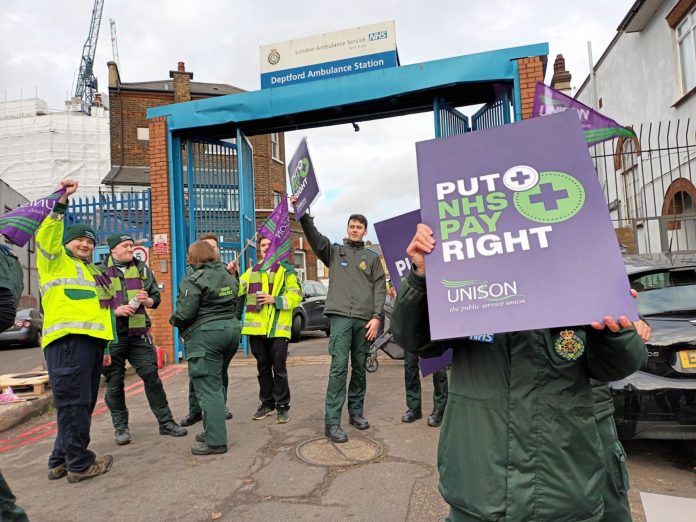Unison member
Covid and now the cost-of-living crisis have brought home to health workers how much they had lost in real wages after a decade of Tory austerity, and workers began fighting to try to win back some of what they had lost.
With hospital consultants in the BMA rejecting their recent pay offer by 51% to 49% and asking the Department of Health to get back to the negotiating table, they join the junior doctors who are continuing their struggle for improved pay.
The consultant pay offer was on average approximately 9% for 2023-24. Junior doctors have been offered on average 12%. This demonstrates that, by putting firm demands and being clear that strike action is needed, pay offers can be improved.
These offers compare to a 5% pay rise for all other NHS staff. The Royal College of Nursing (RCN) remains in dispute over the 2023-24 offer and is talking about reballoting.
However, Unison and GMB unions accepted the 5% after not reaching the anti-trade union ballot thresholds for strike action. Unite rejected it and, although a smaller union in the NHS, has conducted local disputes linking the national offer to additional local demands – for example at Barts Trust.
2024-25 pay
Now the NHS unions, including Unison, are beginning to discuss their demand for the 2024-25 pay round. Have the lessons of last year’s ballots been learned, or are union leaders waiting for the likely incoming Labour government to bail them out?
It appears once again that Unison will be asking members to support a substantial rise but aren’t clear on what that will mean.
Unison leaders will be linking this to a shorter working week with no loss of pay, and other pressing issues such as overtime and cost-of-living supplements. These are all legitimate and pressing concerns and need to be fought for. But they don’t affect all staff in the way that pay does, and so without a clear pay demand it will make it harder to build a united fight such as the doctors have had.
What it risks is professions such as the nurses considering going alone and accepting a separate pay spine from the rest of NHS staff. Nursing, like other professions, has seen significant reductions in real-terms pay.
With 130,000-plus staff shortages in the health service, pay is a crucial issue and can’t be left to wait for the next government. We need to fight now, and demand a commitment now from Labour leader Keir Starmer, which would increase the pressure on the weak Tories.
Many staff work over their 37.5 hours a week to make ends meet and employers rely on this to make up for the shortfall of staff. This can’t go on indefinitely, as it leads to burnout in an increasingly stressful work environment.
Unison’s potential role
Unison, as the largest health union, could play a major role in uniting the workforce and laying down key demands to assist in coordinating the pay struggles. A bold and serious campaign could prepare members for the action necessary.
However, the leadership’s approach, despite recognising the growing pay differentials, does not appear to involve talking about achieving a decent pay rise through industrial action.
Thus the upcoming health service group elections could play an important role in changing the direction of the health leadership and of the union as a whole.
Socialists in the health service demand pay rises that actually reflect the cost-of-living rises, of at least RPI inflation. We should be demanding a minimum of £15 an hour for the lowest paid, who in April will only be earning 1p above the minimum wage! We demand a 35-hour working week with no loss of pay. But we say this will have to be fought for.
The following Socialist Party members are seeking nomination for the 2024 Unison service group elections
Local Government Mathew John, Angie Waller
Health Steve Bell, John Malcolm, Adrian O’Malley
Community Helen Couchman
Police and Justice Amy Sage
Angie, Steve, John and Adrian are all sitting SGE members







